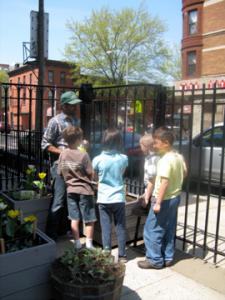P.S. 107 Sunshine Garden
The Sunshine Garden Environmental Expansion furthers students' gardening engagement to frame studies on important environmental issues.
Leader
Michele Israel
Location
1301 8th Avenue Brooklyn, NY 11215
Impact areas
About the project
Students at P.S. 107 have an edible garden that supports healthy eating, environmental stewardship, hands-on science, and school greening. The garden is critical to teaching children about the origin of food, as well as nurturing good nutrition, and engagement in environmental tasks. The proposed project, the Sunshine Garden Environmental Expansion engages 4th graders in gardening to jumpstart their exploration in an environmental issue (one that they identify) for which they will find a proactive solution.
The Steps
Phase I Students explore plant life through varied hands-on tasks, such as seeding, seedling oversight and observation, plant experiments, mini projects that invite students to closely study plant families, etc. Phase II Students identify a single environmental challenge with implications for edible gardening and plant health. As a class, they flesh out a select issue through research to chart its impact. They conduct field studies to further their knowledge; such study can include visiting other school gardens to determine whether the environmental issue has a similar effect, conducting research at a local botanic garden, meeting with botanic/environmental scientists, testing and monitoring plant growth in community gardens, etc. Phase III Students synthesize and report on research/field study findings through student-designed means. Students create a solution to the challenge: what can they do, recommend, create, etc., that could stem the issue's negative impact?
Why we‘re doing it
The garden is also now the center of an environmental action project that will engage 4th and 5th graders in exploring the impact of environmental challenges on edible gardening. Students will participate in indoor and outdoor gardening, and use their gardening experience as impetus for exploring environmental challenges, such as lead-laden soil and truck idling. Students will select an environmental issue to study and then create a practical solution to the problem...something that they can actually implement in or propose to the immediate community, school and otherwise.

